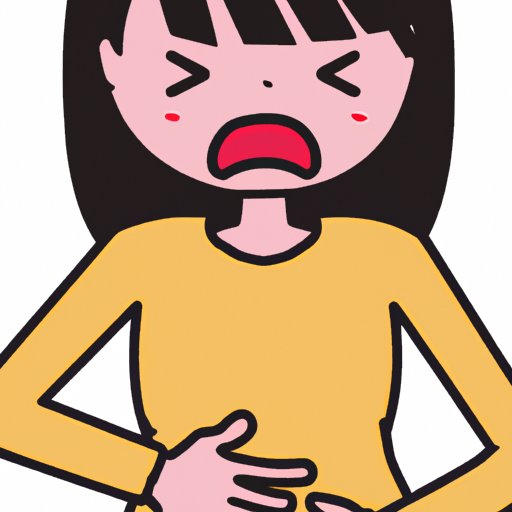
Introduction
Gas is a natural byproduct of digestion. However, when there is excessive gas buildup in the digestive system, it can lead to pain and discomfort. The gas can become trapped, causing bloating and cramping in the stomach.
There are many reasons why gas pain can occur. Swallowing air while eating or drinking, eating certain foods, and digestive disorders are just a few examples. Whatever the cause may be, there are ways to alleviate gas pain.
Prevention of Gas Pain
Prevention is key when it comes to avoiding gas pain. Here are a few things you can do to prevent gas from building up in your stomach:
Eating smaller meals
Eating smaller, more frequent meals throughout the day can help prevent gas buildup in the digestive system. This allows the digestive system to break down the food more efficiently, reducing the risk of gas pain.
Chewing food thoroughly
Chewing your food thoroughly before swallowing can also help prevent gas pain. When food is not properly chewed, it can cause issues with digestion and lead to gas buildup in the stomach.
Avoiding certain foods
Avoiding carbonated drinks, caffeine, and certain foods such as beans, broccoli, and cabbage can also help prevent gas pain. These foods can be difficult to digest, causing gas buildup and discomfort in the stomach.
Over-The-Counter Medications
If gas pain has already set in, there are over-the-counter medications that can help provide relief. Here are a few to consider:
Use of simethicone
Simethicone is a medication that works by breaking down gas bubbles in the digestive system, making them easier to pass. This can provide quick relief for those experiencing gas pain.
Activated charcoal tablets
Activated charcoal is another option for relieving gas pain. It works by absorbing gas in the digestive system, reducing the amount of gas that can build up and cause discomfort.
Yoga Poses
Yoga has been known to aid in digestion and relieve gas pain. Here are a few yoga poses that can provide relief:
Child’s pose
Child’s pose is a gentle yoga pose that can help stretch the digestive muscles and alleviate gas pain. To do this pose, start on your hands and knees with your arms extended in front of you. Slowly lower your hips back toward your heels, stretching your arms out in front of you. Hold this position for several breaths, then release.
Wind-relieving pose
The wind-relieving pose is a yoga pose that is specifically designed to alleviate gas pain. To do this pose, lie flat on your back with your arms at your sides. Bring your knees up to your chest, then hold onto your shins. Gently rock back and forth, or hold the pose for several breaths.
Benefits of Regular Exercise
Regular exercise can also aid in digestion and relieve gas pain. Here’s how:
Improved digestion
Exercise helps to keep the digestive system running smoothly, reducing the risk of gas buildup and bloating.
Reduced stress
Stress can lead to digestive issues, including gas pain. Exercise has been shown to reduce stress levels, improving overall digestive health.
Cardiovascular exercise
Cardiovascular exercise, such as running or biking, can help to stimulate the digestive muscles and promote healthy digestion.
Relieving Stress
Stress can have a significant impact on digestive health, including the development of gas pain. Here are a few tips for reducing stress:
Breathing exercises
Deep breathing exercises can help to reduce stress and promote relaxation, improving digestive health.
Meditation
Meditation is another effective way to reduce stress and promote relaxation. This can help to improve overall digestive health.
Yoga and stretching
Yoga and stretching can also help to reduce stress and promote relaxation, leading to better digestive health.
Conclusion
Gas pain in the stomach can be uncomfortable and painful, but there are ways to treat and prevent it. By following these tips, you can alleviate gas pain and improve your digestive health. Remember to eat smaller meals, avoid certain foods, try over-the-counter medications, and use yoga poses, exercise, and relaxation techniques to help reduce stress and improve digestion.
By making these changes, you can reduce the risk of experiencing gas pain and improve your overall quality of life.
Final advice for those experiencing gas pain in the stomach
If you are experiencing gas pain in the stomach, try some of the tips mentioned in this article. Remember to be patient, as not all remedies will work for everyone. It may take some trial and error to find what works best for you. If you continue to experience gas pain or other digestive issues, be sure to consult with a healthcare professional.





